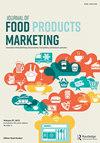Negative Information, Cognitive Load, and Taste Perceptions
IF 2.4
Q2 BUSINESS
引用次数: 2
Abstract
ABSTRACT Previous research on consumer’s evaluation of how good or bad a food product tastes have found that activating memory-based perceptions or presenting non-taste related product information influence the taste judgment. In this study, we extend this stream of research by introducing a cognitive load manipulation, and hypothesize that the effect of negative product information on taste evaluations is reversed under conditions of high cognitive load. A 3-cell between-subjects experimental design was employed to test this assumption, and the results show that cognitive load in fact reverses the previously found effect. In addition, an equal negative effect on purchase intentions and product popularity is also reversed. Theoretical implications for food marketing are offered based on the findings.负面信息、认知负荷与味觉
摘要先前关于消费者评价食品味道好坏的研究发现,激活基于记忆的感知或呈现与味道无关的产品信息会影响味道判断。在这项研究中,我们通过引入认知负荷操纵来扩展这一研究流,并假设在高认知负荷的条件下,负面产品信息对味觉评价的影响是逆转的。采用受试者之间的3细胞实验设计来检验这一假设,结果表明认知负荷实际上逆转了之前发现的效果。此外,对购买意愿和产品受欢迎程度的同样负面影响也被逆转。研究结果为食品营销提供了理论启示。
本文章由计算机程序翻译,如有差异,请以英文原文为准。
求助全文
约1分钟内获得全文
求助全文
来源期刊

Journal of Food Products Marketing
BUSINESS-
CiteScore
5.70
自引率
6.90%
发文量
17
期刊介绍:
From food promotion and advertising through new food product development and consumer behavior research, the Journal of Food Products Marketing provides timely, practical articles that keep food marketers on the cutting edge of their profession. The journal includes refereed research studies as well as opinions, guidelines, and speeches by practitioners that contribute to the better practice and understanding of food marketing. The journal provides a single forum for both food marketing academicians and food marketing practitioners.
 求助内容:
求助内容: 应助结果提醒方式:
应助结果提醒方式:


